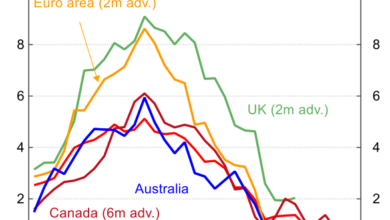An outlook fraught with risk

Australia’s economic outlook for 2024 is likely to be a tale of (roughly) two halves. The first half will likely see monetary policy continuing to bite, while the second half could bring monetary easing, tax cuts, stronger real wage growth, and improved sentiment. However, this narrative is riddled with uncertainty and risks particularly due to a delicate global economic outlook.
Monetary policy in advanced economies continues to present two-sided risks. Easing policy too soon could lead to a resurgence in inflation. Holding interest rates at an elevated level for too long could cure the disease but kill the patient. An added complication is that while most major central banks have maintained a ‘higher-for-longer’ approach to interest rates, financial markets expect cuts to be earlier and quicker than central banks have indicated. The easy miles in the battle against inflation seem to have been run; the final laps are likely to be the hardest.
Protracted conflicts and heightened tensions across the global economy could cause a renewal of supply-side issues. The most recent, and potentially most significant, flashpoint is in the Red Sea. Almost 12% of global trade flows through these waters, but unrest has forced container ships and oil tankers heading to ports in Europe and the United States to reroute around the Cape of Good Hope. While shippings costs and delivery times have increased sharply, oil prices have not spiked. Yet, an escalation of tensions in the Middle East could filter through to energy prices. Other global flashpoints, including the protracted war in Ukraine and tensions across the Taiwan Strait, present risks to the outlook.
China’s economic woes and growing opacity is another cause for concern. A debt-burdened property sector remains at the heart of the country’s economic challenges. Any further spillover to the shadow banking system could catalyse a vicious debt-deflation cycle that weighs on the global economy and Australia.
Additionally, countries that collectively represent 60% of global GDP are set to hold elections in 2024. This includes a presidential election in the United States. Any sharp political pivots may influence future opportunities for Australia, particularly in the green economy.
In Australia, domestic risks are also on the cards. In particular, consumer spending is likely to remain under pressure in the first half of 2024. Real household disposable income per capita has fallen for two years, the household savings ratio has dropped to 1.1%, and pandemic-era excess savings have been drawn down. Additionally, Australia’s relatively high share of outstanding mortgages with variable interest rates makes the economy more sensitive to monetary policy. A ‘higher-for-longer’ approach to interest rates in Australia carries an elevated degree of risk against this backdrop.
Additionally, rapid population growth due to record net overseas migration, a critical tailwind to growth in 2023, is likely to provide less support in 2024. Yet, the housing crisis that it unveiled could get worse before it gets better. Australia has among the lowest housing stock per adult when compared to other developed countries. This is unlikely to improve in the short-term. Low vacancy rates and elevated rental costs are expected to weigh on the economy.
Besides these short to medium-term risks, rapid climate change and above-target global emissions pose a perennial risk to the global economy. A summer of fire and floods in Australia is a reminder of the critical need to cut emissions.
The end of 2024 could still prove to be better than the beginning, but it’s an outlook fraught with risk.
This newsletter was distributed on 24th January 2023. For any questions/comments on this week’s newsletter, please contact our authors:
This blog was co-authored by Lester Gunnion, Manager and Sam Guthrie,
Vacationer at Deloitte Access Economics
Click on the links below to read our previous Weekly Economic Briefings:




